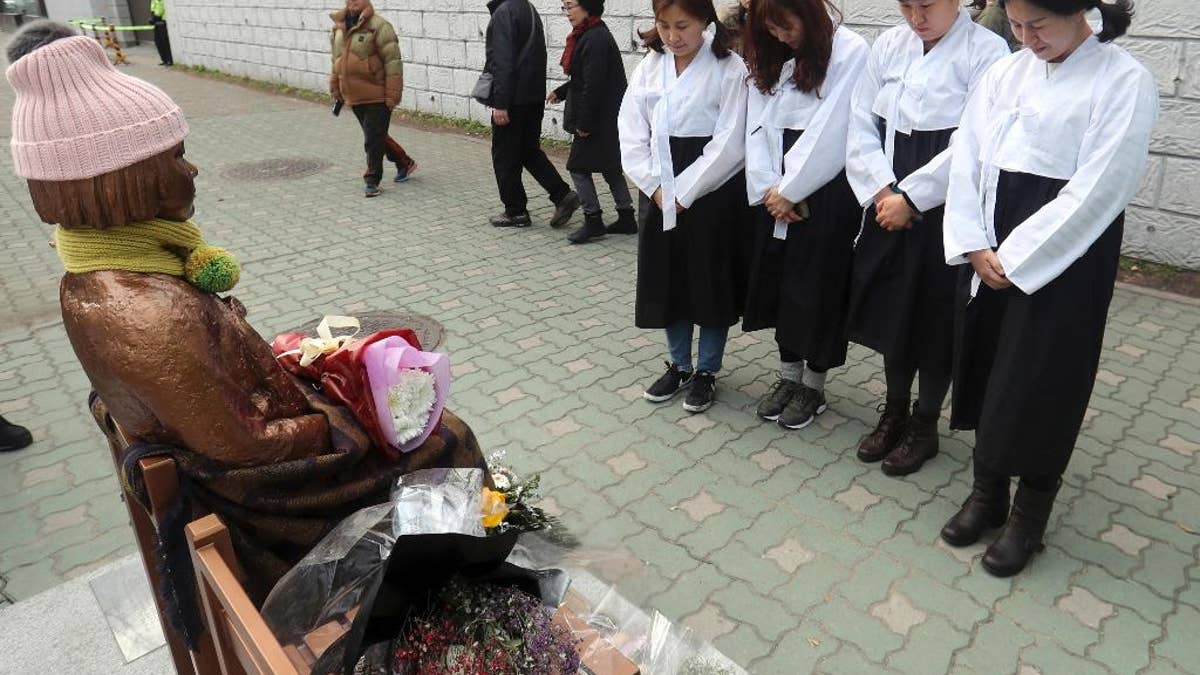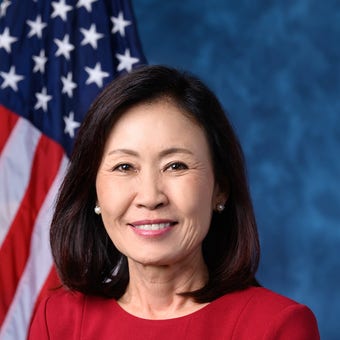Asian 'Comfort Women' memorial causing conflict
Ainsley Earhardt on surviving 'Comfort Women' telling their terrifying story from WWII
A few weeks ago, Harvard Professor J. Mark Ramseyer sparked a global outrage by rewriting a history that remains painful for many families today.
Ramseyer wrote an article – "Contracting for Sex in the Pacific War" – about Korean comfort women that was criticized by individuals, organizations and groups around the world as factually inaccurate and misleading. His article suggested that these women were voluntarily contracted to participate in prostitution. This article caused an outpouring of anger among the Asian American and academic communities, and rightfully so.

FILE - In this Feb. 3. 2014, file photo, a visitor looks at portraits of late former "comfort women" who were forced to serve for the Japanese troops as a sexual slave during World War II, at the House of Sharing, a nursing home and museum for 10 former sex slaves, in Toechon, South Korea. ‘Comfort women" were present wherever the Japanese Imperial Army invaded and occupied in Asia from the early 1930s through the end of World War II. That aspect of wartime history was kept quiet until the early 1990s, when a South Korean woman came forward, joined by some others, seeking Japanese help and accountability. (AP Photo/Ahn Young-joon, File) (The Associated Press)
As a Korean American woman who was born in South Korea and raised in Japan, I am very familiar with the history of comfort women. I have heard from so many in the Asian American Pacific Islander community following the publishing of Ramseyer’s article.
We are deeply upset about his writings, and I cannot stand by while he rewrites history and misleads future generations about the truth. For too long the experiences of these women have been covered up and nearly forgotten, and his article only contributes to the harmful denial of the very painful and true events these women endured.
"Prostitutes have followed armies everywhere, and they followed the Japanese army in Asia," Ramseyer wrote. This is not only a deeply offensive way to describe these women, it is untrue. The reality is hundreds of thousands of women were kidnapped and subjected to forced sex slavery by the Imperial Japanese Army between 1932 and 1945.
More from Opinion
- Rep. Debbie Lesko: Biden's COVID vaccine plan – America Last. Why put illegal immigrants ahead of US seniors?
- Rebecca Masterson: Our nation's foster kids shouldn't be invisible -- here's one thing that must happen now
- Lauren Appell: Dr. Seuss silenced – sobering lessons as cancel culture strikes beloved author
The mass rapes and horrifying violence that happened during the Nanking Massacre horrified many around the world, and in an attempt to "satisfy" Japanese soldiers, brothels were set up across Imperial Japan in an effort to prevent another mass rape from happening. This decision forced upwards of 200,000 women into forced slavery. Many were kidnapped off the street, never to see their families again.
These women lived in horrible conditions and were subjected to continual rapes. A 1996 United Nations Commission on Human Rights report included testimony from women and girls who lived this horror firsthand.
"I was never paid for my ’services.’ I worked for five years as a ‘comfort woman,’ but all my life I suffered from it," said Kum Ju Hwang of Korea, who was 73 years old when she told her story. The women "told of their experiences under great emotional strain," the report says, and details many subsequent kidnappings, physical and emotional abuses, rapes and murders of tens of thousands of women.
Our children and grandchildren should be taught an accurate history, even if it is a painful one.
Unfortunately, many of these women did not survive. They died of sexually transmitted infections, complications that stemmed from their violent abuse, or by suicide. The mass enslavement of these women is an ugly stain on Japan’s history.
For Ramseyer to minimize the painful experience of these women is deeply harmful. Only a couple of hundred women who lived this horror are alive today.
They have testified and shared their stories, even though in doing so they relive painful memories, because they needed future generations to know the truth. Those in positions to educate like Ramseyer should use their platform to do so – not to rewrite history. What happened to these women can never be repeated.

South Korean women wearing traditional dress pay theirs respects to a "comfort-woman" statue set up in front of the Japanese consulate in Busan, South Korea, Friday, Jan. 6, 2017. Japan announced Friday that it would recall its ambassador to South Korea and suspend economic talks in response to the placing of a "comfort-woman" statue representing wartime sex slaves in front of its consulate in the Korean port city of Busan. (Kim Sun-ho/Yonhap via AP) (The Associated Press)
Today is International Women’s Day, and it is a time to honor the women who came before us, paving the way for future generations of female leaders. The women who lived this horror deserve recognition too, because the truth matters.
CLICK HERE TO GET THE OPINION NEWSLETTER
When we cover up our history, we are doomed to repeat it. It is up to us to make sure that these types of atrocities never happen again. Our children and grandchildren should be taught an accurate history, even if it is a painful one.
I urge my colleagues in Congress and those who care about the truth to denounce Ramseyer’s writing. He owes his students, and the hundreds of thousands of families who have lived this horror, an apology.










































